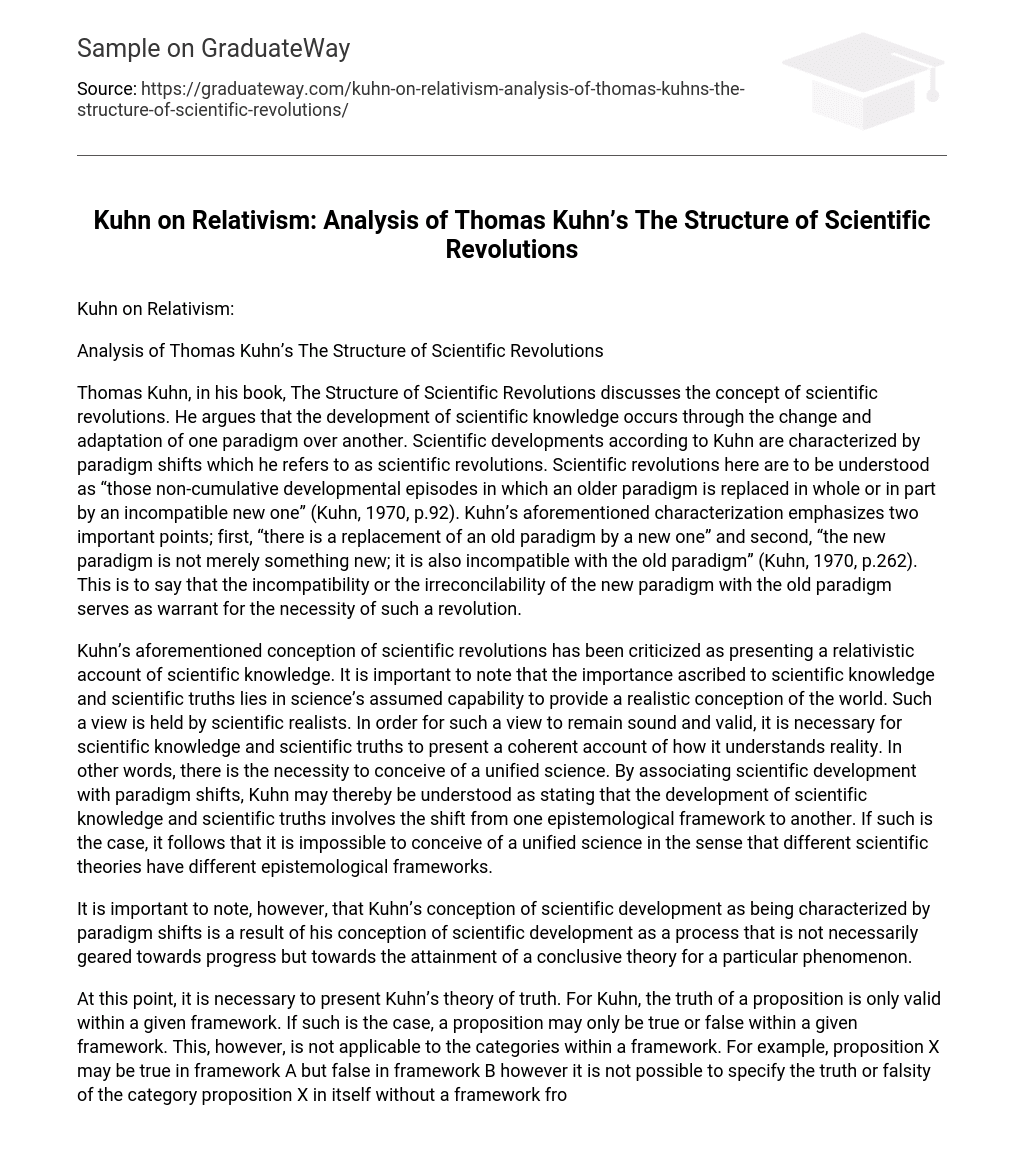Kuhn on Relativism:
Analysis of Thomas Kuhn’s The Structure of Scientific Revolutions
Thomas Kuhn, in his book, The Structure of Scientific Revolutions discusses the concept of scientific revolutions. He argues that the development of scientific knowledge occurs through the change and adaptation of one paradigm over another. Scientific developments according to Kuhn are characterized by paradigm shifts which he refers to as scientific revolutions. Scientific revolutions here are to be understood as “those non-cumulative developmental episodes in which an older paradigm is replaced in whole or in part by an incompatible new one” (Kuhn, 1970, p.92). Kuhn’s aforementioned characterization emphasizes two important points; first, “there is a replacement of an old paradigm by a new one” and second, “the new paradigm is not merely something new; it is also incompatible with the old paradigm” (Kuhn, 1970, p.262). This is to say that the incompatibility or the irreconcilability of the new paradigm with the old paradigm serves as warrant for the necessity of such a revolution.
Kuhn’s aforementioned conception of scientific revolutions has been criticized as presenting a relativistic account of scientific knowledge. It is important to note that the importance ascribed to scientific knowledge and scientific truths lies in science’s assumed capability to provide a realistic conception of the world. Such a view is held by scientific realists. In order for such a view to remain sound and valid, it is necessary for scientific knowledge and scientific truths to present a coherent account of how it understands reality. In other words, there is the necessity to conceive of a unified science. By associating scientific development with paradigm shifts, Kuhn may thereby be understood as stating that the development of scientific knowledge and scientific truths involves the shift from one epistemological framework to another. If such is the case, it follows that it is impossible to conceive of a unified science in the sense that different scientific theories have different epistemological frameworks.
It is important to note, however, that Kuhn’s conception of scientific development as being characterized by paradigm shifts is a result of his conception of scientific development as a process that is not necessarily geared towards progress but towards the attainment of a conclusive theory for a particular phenomenon.
At this point, it is necessary to present Kuhn’s theory of truth. For Kuhn, the truth of a proposition is only valid within a given framework. If such is the case, a proposition may only be true or false within a given framework. This, however, is not applicable to the categories within a framework. For example, proposition X may be true in framework A but false in framework B however it is not possible to specify the truth or falsity of the category proposition X in itself without a framework from which proposition X will be assessed. His theory of truth is evident in The Structure of Scientific Revolutions as he posits that the ‘truth’ of a proposition within a particular scientific paradigm is only sound and valid within that paradigm and hence the progress of science lies in its ability to determine which scientific paradigm is best able to account for a particular phenomenon.
Within this context, it is possible to account for the criticism which states that Kuhn presents a relativistic account of scientific knowledge and scientific truth. In his reply to his critics, Kuhn claims, “irrationality, relativism, and the defense of mob rule…are all labels which I categorically reject” (2000, p.126). His rejection may be understood as his own application of his theory of truth in relation to his view of scientific truth and scientific knowledge. Since Kuhn adapts a theory of truth wherein the truth of a proposition is dependent upon the framework in which the proposition is assessed, it follows that it is only possible to assess his claim within his theory. In other words, the truth of Kuhn’s claim is dependent upon the coherence of his claim in relation to his theory. In this sense, one may state that Kuhn is privy to relativism however it is important to note that the relativism in itself assumes the existence of a unified theory from which one may assess the validity of a particular theory’s conception of truth and knowledge. Within this context, it is possible to state that Kuhn answered his critics by pointing out that they are also assessing the truth of his claim within the context of their theory however due to the incommensurability of their theories, it follows that they would find his theory problematic. Through this presentation of the doctrine of incommensurability, Kuhn was able to provide an adequate reply to his critics. Kuhn’s reply however may be proven invalid if a theory is able to prove that it is possible to translate one theory to another so that a proposition may have the same truth value in two or more different paradigms.
References
Kuhn, T. (2000). The Road Since Structure: Philosophical Essays, 1970-1993, with an Autobiographical Interview. Eds. J. Conant & J. Haugeland. Chicago: U of Chicago P.
___. (1970). The Structure of Scientific Revolutions. Chicago: U of Chicago P.
WORD COUNT: 800 words





